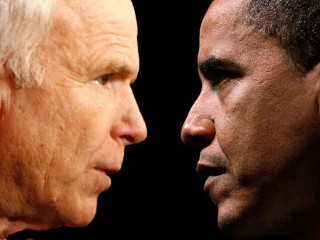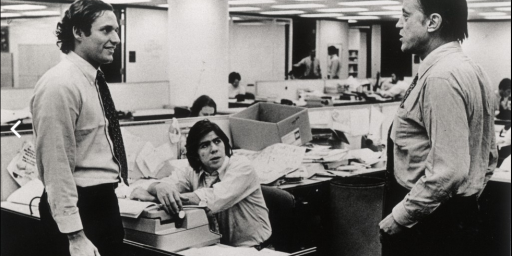Bush the New Comeback Kid?
David Broder argues that, like Bill Clinton in 1994, George W. Bush is using the loss of Congress in midterm elections to reassess his tactics and thereby mounting a surprising political comeback. In addition to some deft moves in deflecting the debate over his proposed Iraq troop surge, Broder believes Bush is broadening his support by reaching out and making nice:
He has been far more accessible — and responsive — to the media and public, holding any number of one-on-one interviews, both on and off the record, leading up to Wednesday’s televised news conference. And he has been more candid in his responses than in the past.
While forcefully making his points, he has depersonalized the differences with his critics and opponents. He has not only vouched for the good intentions of congressional Democrats, he has visited them on their home ground, given them opportunities to question him face to face, and repeatedly outlined areas — aside from Iraq — where he says they could work together on legislation: immigration, energy, education, health care, the budget.
Given Nixonian poll numbers and the most unpopular war in more than thirty years, simple regression to the mean should bring Bush’s public standing up. Big Tent Democrat is right, too, that the new majority is likely overplaying its hand, which will bring the president’s relative standing up. To extend Broder’s comparison, Newt Gingrich and company did as much as Bill Clinton to restore the latter’s standing.
Joe Gandelman sees this happening now, as the new congressional majority is forced to take action rather than merely criticize, thus risking alienating their base, moderate voters, or both.
That’s all right, I think. Bill Clinton had two advantages, though over Bush, in his attempt to regain “relevance.” First, Clinton was a great communicator and natural empath who was able to charm his way back into the public’s good graces. Bush has his moments but he’s mostly still incredibly awkward in his public appearances. Second, Clinton was riding the wave of peace and prosperity occasioned by the end of the Cold War and the emergence of the World Wide Web almost at the exact moment he assumed the presidency. Bush inherited a post-bust economy and the 9/11 attacks then got bogged down in a nasty guerrilla-terrorist war in Iraq. Under those conditions, he’s can only bounce so high.






Bush is too far into his Presidency to scale back the hands of time. For six years he has gone to the extreme right, attacking Democrats and having his own way with Iraq.
He had no plans going in, and the political solution, that is the only solution, is nowhere in sight.
Too little too late for Bush. The divisions that he has made because of partisan politics has made him into a one hit wonder, this is why yet another surge is taking place, because the military is the only solution he knows.
And diplomacy is no longer an option, not because he doesn’t want it, but no one wants to engage in diplomacy with him.
His poll numbers will stay the way they are.
And more importantly Clinton’s policies were approved by all Americans and the people thought the policies were under attack by the conservatives as well as Clinton. So by giving approval to Clinton people were also giving approval to his policies.
Bush, on the other hand, is not only a horrible person but none of his policies are good for the country. I think most people are against the Bush policies and this translates into lower approval ratings, for him as president, as well.
“then got bogged down”.
See? It wasn’t even W’s fault! He “got bogged down”. Could have happened to anybody.
It’s amazing, isn’t it? Everything good happened to Clinton, but everything bad happened to Bush. Just happened, in both cases.
The sick joke is that, if people who said that actually believed it, they’d support me in a little of that ‘old time religion’, namely ‘the King is the Land, the Land is the King’.
It’s amazing, isn’t it? Everything good happened to Clinton, but everything bad happened to Bush. Just happened, in both cases.
Clinton deserves some credit for his commitment to free trade. Bush and his people made some big mistakes in Iraq.
Beyond that, though, much of this stuff is happenstance. Clinton didn’t end the Cold War but he got the resulting peace dividend. He also didn’t do much to fight back bin Laden and company, allowing it to become a much bigger problem that Bush inherited.
Netscape came on line in 1993, inaugurating the Web as we know it. Clinton had zippo to do with that but reaped the economic windfall of the dot.com boom. The bust happened at the very tail end of his term, leaving Bush to inherit a recession that was further exacerbated by the 9/11 attacks.
They’re already feeding on balls, so don’t mention mounting again. It’s pain, cancer, assumption by the dead or a mounting disease.
I don’t think that regression to mean means what you think regression to the mean means.
“Bush and his people made some big mistakes in Iraq.”
Yeah. And the Hindenberg was a minor setback for airship aviation.
Dear lord. Do you really not get it? Do you ever want to get another independent vote for the Republican Party again?
all terrorist-Americans anyhow
Wishful thinking. Commentators like Broder tied themselves so tightly to the Bush policy of peace through democracy, the only way they will survive now is if their hero can be made to seem strong again and in one mighty bound, break free. Such fantastical thinking is only possible within the fuzzy confines of the magical beltway.
Here on the outside, the clear light of day shows us a moral landscape devastated by the dishonesty and incompetence of the last six years. From a country that fought torturers and battled with those who would deny others their basic human rights to a nation that revels in the brutalization of the untried and the destruction of a civilization that was no threat to the United States.
Ladies and gentlemen, the Kool-Aid-drenched nuance of the Left. “Clinton all good, Bush all bad.” Scary.
Bush didn’t “inherit” either of these things. He was at the helm during the bulk of the recession and was reading My Pet Goat shortly after his month-long vacation when the terrorists attacked.
He was at the helm during the bulk of the recession and was reading My Pet Goat shortly after his month-long vacation when the terrorists attacked.
The recession began in the latter part of the Clinton administration. Not, incidentally, because of anything Clinton did but the natural movement of the business cycle combined with the correction of the “irrational exuberance” over all things Internet. Bush coming to office wasn’t going to magically fix that.
Presidents do all manner of things, including photo-ops at schools to press an educational reform agenda. Clinton did that sort of thing, too. The planning for the 9/11 attacks was well underway at the time Bush took office and al Qaeda had already run numerous successful attacks on American targets.
Bush inherited a quarter of poor economic performance, but recessions are sustained periods of decline in an economy. According to the NBER the recession began in March 2001 and ended in Nov. 2001.
Recessions are determined ex post facto. At the time of Bush’s elevation no recession could have been “inherited” since it hadnt happened yet.
Bush inherited a quarter of poor economic performance, but recessions are sustained periods of decline in an economy. According to the NBER the recession began in March 2001 and ended in Nov. 2001.
A recession is usually defined as three consecutive bad quarters, I think. At any rate, lag effects being what they are, Bush certainly inherited the recession. Again, that’s not blaming Clinton–who didn’t adopt any change that I’m aware of that screwed up the economy–just saying that it wasn’t Bush’s fault, either.
“And more importantly Clinton’s policies were approved by all Americans”
This statement is funny in that it says more about the person writing it as an actual predicate of fact than its actual truthfulness. Regardless of one’s political view (pro or con Clinton or Bush), a statement like this this should immediately raise the BS flag for anyone who may be looking for an inciteful opinion from the contributer. That is of course is the problem with the discussion of politics these days, too many agendas in search of objective arguments to support predetermined opinions.
Au contraire, I believe inciteful opinions are exactly what they seek and offer. Insightful opinions on the other hand are few and far between.
I stand corrected (and humbled) by a typographical error.
I, too, noted the interesting use of the passive voice.
James, aside from the standard lies about Clinton, which are pretty stale by now, and aside from the fact that Bush has been screwing things up consistently for six years, ‘regression to the mean’ would be evident to anybody who examined his poll numbers in the period after 9/11.